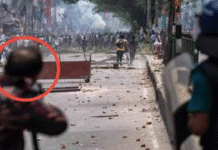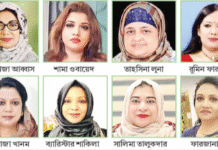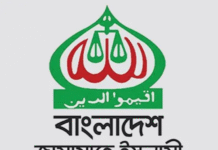The Daily Star
Obstructing freedom of speech is an affront to democracy

The statement from the home ministry forbidding people from spreading “false, fabricated, confusing, and inciting statements” on social media about government, military, police officials and members of other law enforcement agencies is yet another worrying development in the erosion of freedom of speech in Bangladesh. The statement condemns “false and baseless news about the security forces, which is threatening to ruin the peace in the country, and spreading fear, concern and confusion among the general public.” It adds: “the government has observed the activities of such people with patience, and has come to the conclusion that it is necessary to take legal action against such people to maintain stability, domestic security and public well-being.”
One might be forgiven for thinking that perhaps what is truly spreading fear, concern and confusion among the general public is the continued silencing of dissenting voices, even as violence against women, widespread corruption and enforced disappearances continue—all of which have been the subjects of heated debates on social media platforms over the past few weeks. Even when you can get past the sheer absurdity of trying to police public online platforms, something that tech giants like Facebook and Twitter are failing to do, the questions that come up are numerous. In this “post-truth”, modern world, what counts as “false, fabricated, confusing and inciting statements”? Based on what legal guidelines or written codes can the government decide what kind of statements are ruining the peace or harming public well-being? What sort of “legal action” will be taken in these scenarios—does this simply give way to greater use of the draconian Digital Security Act? Will this give more scope to cover up abuses of power and hide inconvenient truths?
This is not the first time we have seen the government respond to criticism and widespread debate and discussion on a certain issue, especially on social media, by simply shutting it down. In the wake of the coronavirus crisis in Bangladesh, when the public health sector was facing severe scrutiny and the health ministry was widely criticised for mishandling the pandemic, the health minister ordered all health officials to stop talking to the media, and the public administration ministry asked all secretaries to ensure that no public servant can talk to or write in the media without prior approval. This month, the Department of Secondary and Higher Education issued a circular forbidding students and teachers from writing, sharing or even “liking” anything that “ruins the image of the government or the state”, or “disrespects any important person, institution or profession” on social media. Now, it is the general public who have been told to watch what they say or write.
The Constitution of Bangladesh guarantees the right of every citizen to freedom of speech and expression. Regulating what ordinary citizens can post, share or even “like” on social media is not the symptom of a democratic nation but rather an Orwellian society. We urge the authorities to immediately rescind this unconstitutional statement, which is an attack on our fundamental right to free speech.









